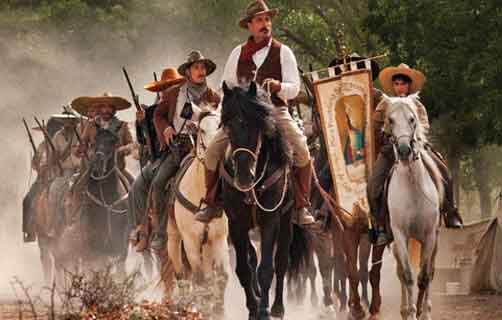
FGF E-Package
The Confederate Lawyer
June 20, 2012
For Greater Glory:
A Movie Review
by Charles G. Mills
fitzgerald griffin foundation

GLEN COVE, NY — It is fortunate that For Greater Glory was released in the United States immediately before the American Catholic Bishops’ campaign to educate people about religious liberty. This is one of the greatest films about religious liberty ever made.
It is set during the Mexican Cristero War from 1926 to 1929. This civil war began when Plutarco Elias Calles, President of Mexico from 1924 to 1928, decided to enforce with extraordinary harshness the anti-Catholic provisions of the 1917 Constitution. Peaceful protests quickly led the government to kill priests and other Catholics and to close all the churches. In response, the Mexican people rose up to form several spontaneous armies against the government. The armies eventually were united in a single command under retired general Enrique Gorostieta Vetorde. The popular army was known as the Cristeros.
In 1929, the Cristeros laid down their arms on orders from the Vatican and their bishops in exchange for the re-opening of the churches and the end of the killings. Many Cristeros who were winning the war preferred to fight on for more complete Catholic freedom, such as the right of priests to wear cassocks in public and of the church to publish newspapers.
The film tells the stories of martyred priests and of Blessed Jose Sanchez del Rio, martyred at the age of 14 on the orders of his uncle when Jose would not renounce Christ under torture. The main heroes of the film are General Gorostieta and one of the two priest-generals in the war. General Gorostieta, not a religious man when the war started, believed strongly in religious freedom. In the movie, his fellow general, the priest, hears his confession at a pivotal moment. We know, historically, that he did indeed become a practicing Catholic shortly before the end of the war, whether or not it was the work of his fellow general.
While the heroes of the film are well developed, President Calles remains one dimensional. He does extraordinarily wicked things without offering the audience an explanation. There is one reference in the middle of the film to the American belief that he was a Communist. Although he did share many characteristics with the Communists, including a brutal hatred of religion, the real reason for his crimes is hidden from the audience. For most of the twentieth century, the Mexican government was dominated by a truly vicious form of Free-masonry. It was Freemasonry, not Communism, which drove him to kill 14-year-old boys and feeble old priests. Perhaps Mexican audiences understand this history, but American audiences may be unable to appreciate the role that Freemasonry played in the violence.
For Greater Glory has valuable lessons for us in the United States as we face President Obama’s war on the Catholic Church. Officially, the Cristero War ended when the United States helped to achieve an agreement to re-open the churches and stop the killings, but in some ways the war never ended. When the Holy Father celebrated Mass in Guadalajara recently, the Mass ended with a long form of the battle cry of the Cristeros, “Viva la Virgin de Guadalupe. Que viva. Viva Cristo Rey. Que Viva....”
The Confederate Lawyer archives
The Confederate Lawyer column is copyright © 2012 by Charles G. Mills and the Fitzgerald Griffin Foundation, www.fgfBooks.com. All rights reserved.
For additional information on the For Greater Glory movie, see Anita Crane's article from World Net Daily and Cristeros' lecturer, Christopher Check's essay in Crisis magazine.
Charles G. Mills is the Judge Advocate or general counsel for the New York State American Legion. He has forty years of experience in many trial and appellate courts and has published several articles about the law.
See his biographical sketch and additional columns here.
To sponsor the FGF E-Package, please send a tax-deductible donation to the:
Fitzgerald Griffin Foundation
344 Maple Avenue West, #281
Vienna, VA 22180
1-877-726-0058
publishing@fgfbooks.com
or donate online.
@ 2025 Fitzgerald Griffin Foundation